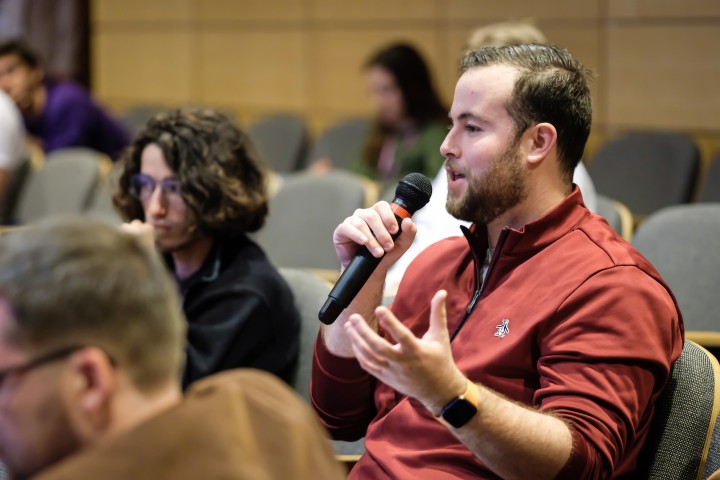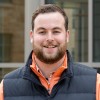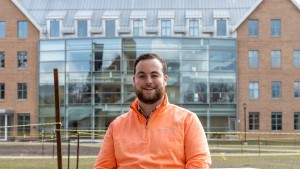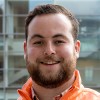The Collegian was one of the first extracurricular activities I got involved with at Kenyon. There, I realized that I enjoyed writing. Almost every week, I wrote a story about a sporting contest, a student athlete’s achievement or a new hire in the athletics department. I learned how to ask questions that prompted conversation, helping me email and talk with fellow members of the Kenyon community. Having interviewed many people through my jobs, I now realize the importance in the phrasing of a question.
During my first year and sophomore year, I was also involved with Kenyon’s shared governance. As a member of the First-Year-Class Committee (FYCC), a Campus Senator, and Chairperson of Buildings, Grounds and Sustainability Committee on Student Council and others, I listened to my fellow classmates to try and understand their concerns. I learned how to ask clarifying questions to ensure that I was accurately representing their concerns when talking with my colleagues. I am proud to have contributed to meaningful changes made at Kenyon student-employment during my time as a Senator and as a Student Council member working to improve services in Chalmers Library.
At the beginning of sophomore year, I also started my first of the four campus jobs I now hold. In the Admissions office, I started as a tour guide and worked my way up to Senior Co-Head Tour Guide. While working in both Ransom Hall and Lowell House, I learned how to ask questions that would help my fellow student workers complete their jobs. While there may be a manual, there is no document that can cover everything that a tour guide, fellow or intern would need to know. I am thankful to Admissions for teaching me how to be nimble on my feet, learning to adapt to different situations with ease.
I cross Wiggins street, thinking about the road towards the Wright Center, where I worked as the Editor of Publications/Annual Reports for the Office for Community Partnerships (OCP). At OCP, I worked to produce a newsletter each semester to help inform members of Knox County about various groups’ involvement with Kenyon College. Interacting with community members of Knox County expanded my perspective on what it means to live in a rural community. I crafted my interview questions not as one-offs, but as conversation starters. I enjoyed talking to people about their experiences and what their relationship with Kenyon means for them.
Working in the Writing Center as a writing consultant and tutor, I used my experience in my other jobs to help improve other student’s writing skills. While asking long questions can be helpful for conveying your point, I often found that simple questions can be more beneficial in getting meaningful answers. I used the student’s responses to help them mold their pieces.
In writing for the Office of Communications, not only do I write about my experience at Kenyon for the First Person blog (like in this post), but I also write news about Kenyon. The topics I covered in my pieces varied from highlighting Kenyon’s experience with virtual reality to interviewing the President of Student Council. I will forever be grateful to the Office of Communications for their support of my writing.
I walk between Ascension Hall and Samuel Mather Hall, looking at Higley Hall with the large auditorium. I am reminded of the various speakers I saw throughout my time at Kenyon. Most of the time, the events were sponsored by The Center for the Study of American Democracy (CSAD). Each speaker brought an expert’s perspective on an issue.

After the talk, students were invited to ask questions. Since I usually only got one question, I had to make sure that it was a good one — a question that made me seem knowledgeable and interested in the talk. While I didn’t always agree with the presenter, they almost always challenged me to think about an issue in a different way.
Like the speakers that made a stop in Gambier, Kenyon professors also challenged me to think critically about my own beliefs. While I can’t say that I did the readings for every single class period (to my professors who are reading this, it was never your class that I missed), each reading represented viewpoints of a larger academic conversation. In lower-level classes, professors would bounce around the room asking people what the authors said and how they were different from each other and our own views. In this sense, professors are the facilitators of the larger discussion in society.
In seminars, the professors sit back and let the students discuss the material. Each week for three hours, the class dives deep into a topic. As the course progressed in the semester, I started to know what my classmates thought. It was not enough to argue my point — I had to anticipate what my peers had to say. In short, I learned how to have a respectful debate. Sometimes the professor stepped into the conversation to guide it, but the rest of the time I was in the deep end with my classmates. We were all trying to figure out the material together.
However, simply describing professors as moderators is grossly unfair. Professors also inhibit a deep sense of care for you as not only a student, but also as a person. Oftentimes, I lingered after class to discuss how that day’s discussion related to one of my other courses I took. In office hours, I talked with professors about my plans for the weekend. At their houses, we talked about life on campus and affairs outside of academics. Each time I talked to a professor, I was challenged to become a better orator and thinker. Showing up to a class, office hours or their house, required me to be my best. There is nowhere to hide at Kenyon, but professors always helped me become a better person.
I am now approaching Old Kenyon. To the west the sun is setting, a reminder of the short time I have left. I look back at the beautifully unpaved trail, thinking about how my time at Kenyon was not always smooth. However, when people ask if I like Kenyon, I say, “No, I love Kenyon.”
I am very fortunate to have been able to do so many things during my four years here. There are so many people who have helped me along the way. If you have followed my work for a while, thank you for following me on my journey. This is not a goodbye, but rather a see you later.
I now look beyond Old Kenyon to the world beyond Gambier and Knox County. As I get set for entering the real world, there are so many questions that I have: What will my first job be like? What types of social things will I do outside of work? Am I going to succeed in life?
The world, like Middle Path, is not always smooth. As I talk to older generations, I feel that it will be my generation’s duty to help improve society. While there was no one student organization, job on campus or Kenyon course that showed me exactly how to fix things, I now know where to start: by asking questions and to persevere until I have an answer.



